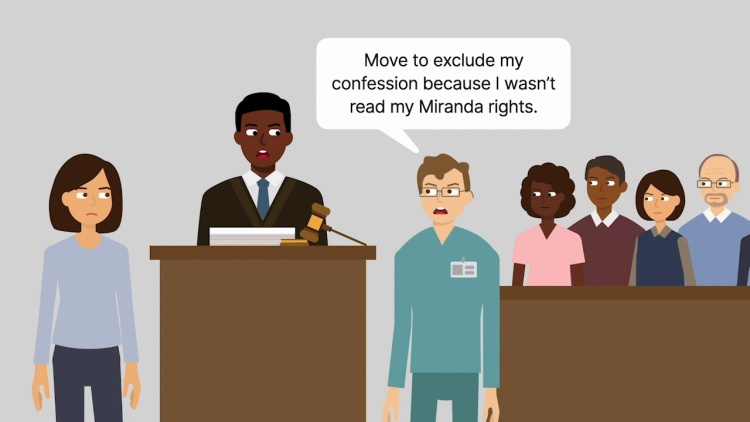Vega v. Tekoh
United States Supreme Court
142 S. Ct. 2095, 597 U.S. 134 (2022)
- Written by Abby Roughton, JD
Facts
Terence Tekoh (plaintiff) was a certified nursing assistant who was accused of sexual assault by a patient. Los Angeles County Sheriff’s Deputy Carlos Vega (defendant) responded to the hospital where Tekoh worked and questioned Tekoh at length without informing Tekoh of his rights under Miranda v. Arizona. Tekoh eventually wrote a statement apologizing for inappropriately touching the patient’s genitals. Tekoh was arrested and charged with unlawful sexual penetration, and his written confession was admitted at trial. Tekoh was acquitted and subsequently sued Vega under 42 U.S.C. § 1983, seeking damages for an alleged violation of his Fifth Amendment right against compelled self-incrimination. At trial in the § 1983 action, Tekoh asked the district court to instruct the jury that if the jury found that Vega had taken an un-Mirandized statement from Tekoh that was improperly used against Tekoh at trial, the jury was required to find that Vega had violated Tekoh’s Fifth Amendment right. The court refused to give Tekoh’s requested instruction, reasoning that a Miranda violation could not independently form the basis for § 1983 liability. The court instead instructed the jury that the jury needed to determine based on the totality of the circumstances whether Tekoh’s Fifth Amendment right had been violated because his statement had been improperly coerced or compelled. The jury ultimately found for Vega, and Tekoh appealed. The Ninth Circuit reversed, holding that the improper use of a statement obtained in violation of Miranda against a defendant in a criminal proceeding was a Fifth Amendment violation that could support a § 1983 claim against the officer who obtained the statement. The Ninth Circuit denied rehearing en banc, and the United States Supreme Court granted certiorari.
Rule of Law
Issue
Holding and Reasoning (Alito, J.)
Dissent (Kagan, J.)
What to do next…
Here's why 907,000 law students have relied on our case briefs:
- Written by law professors and practitioners, not other law students. 47,100 briefs, keyed to 996 casebooks. Top-notch customer support.
- The right amount of information, includes the facts, issues, rule of law, holding and reasoning, and any concurrences and dissents.
- Access in your classes, works on your mobile and tablet. Massive library of related video lessons and high quality multiple-choice questions.
- Easy to use, uniform format for every case brief. Written in plain English, not in legalese. Our briefs summarize and simplify; they don’t just repeat the court’s language.





